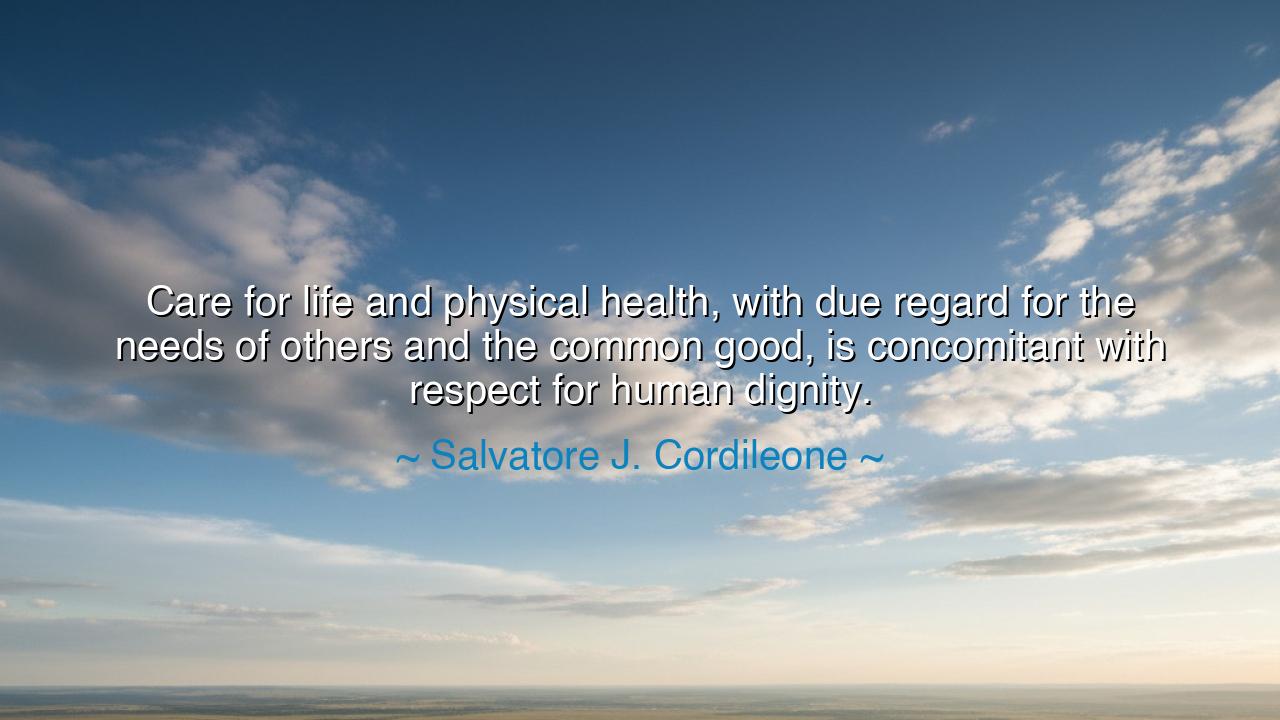
Care for life and physical health, with due regard for the needs
Care for life and physical health, with due regard for the needs of others and the common good, is concomitant with respect for human dignity.






The words of Salvatore J. Cordileone—“Care for life and physical health, with due regard for the needs of others and the common good, is concomitant with respect for human dignity.”—resonate with the wisdom of the ancients, carrying a profound moral and civic imperative. At their core, they teach that health is not merely personal, but communal, and that to nurture the body is also to honor the shared fabric of society. Cordileone reminds us that the individual and the collective are intertwined: to care for oneself without caring for others is incomplete, just as to serve society while neglecting one’s own well-being is unsustainable. True respect for human life begins with dignity, both given and received.
In this reflection, the idea of care for life and physical health emerges as a sacred duty. The ancients, from Hippocrates to Confucius, recognized the body as the vessel of thought, spirit, and action. They knew that neglecting the body diminishes one’s ability to act rightly in the world. Cordileone echoes this principle, insisting that attending to physical health is not selfish indulgence, but a prerequisite for fulfilling moral and social obligations. Only a body and mind maintained with care can participate fully in the common good.
The origin of this quote lies in Cordileone’s engagement with both moral philosophy and public discourse, a synthesis of ethical, social, and practical wisdom. He connects personal health to communal responsibility, reflecting the understanding that a society flourishes when its citizens are not only morally upright but also physically able to engage with the world. His words are a call to mindfulness: that every act of care for one’s body is simultaneously an act of service to humanity.
History is replete with examples of this intertwined responsibility. Consider the story of Florence Nightingale, who transformed healthcare not solely through compassion but through attention to hygiene, nutrition, and the physical environment of soldiers. She understood that physical care and social care are inseparable; healing the body was a way to honor the dignity of life, and in doing so, she uplifted both individuals and the collective society. Cordileone’s words echo this ancient wisdom: to neglect health or communal obligation is to diminish human dignity itself.
Moreover, the quote speaks to the ethical dimension of care. Respect for the needs of others and the common good is not merely a civic obligation, but a moral act that affirms human worth. The ancients, from Aristotle to Cicero, argued that virtue manifests in action for the community, not just in private contemplation. Cordileone extends this argument into the realm of health, implying that self-care without consideration for others is incomplete, and that the flourishing of one depends upon the flourishing of all. Dignity is realized not in isolation, but in relational responsibility.
In practical terms, this teaching compels us to balance personal health with societal awareness. Maintaining one’s physical well-being—through nutrition, exercise, and rest—is foundational, yet equally important is attending to the welfare of others. Whether through public service, charity, or simple acts of compassion, one honors life and human dignity. Cordileone’s message is timeless: a society of healthy, conscientious individuals is a society capable of justice, progress, and moral resilience.
The lesson, therefore, is profound and actionable: care for yourself as you care for others, and recognize that each action taken for your own health resonates outward, contributing to the welfare of the community. Every effort to maintain physical vitality is also an affirmation of respect for human dignity; every act that elevates the common good honors life itself. It is a dual responsibility, ancient and enduring, linking personal virtue with civic integrity.
And so, my children, remember this eternal truth: to nurture your body is to honor the soul, and to honor the needs of others is to protect your own dignity. Let your health be both shield and instrument, empowering you to serve, to teach, and to act for the common good. For in attending to life, health, and society, you participate in the sacred task of upholding the dignity of every human being, and in so doing, you uphold the greatness of civilization itself.






AAdministratorAdministrator
Welcome, honored guests. Please leave a comment, we will respond soon